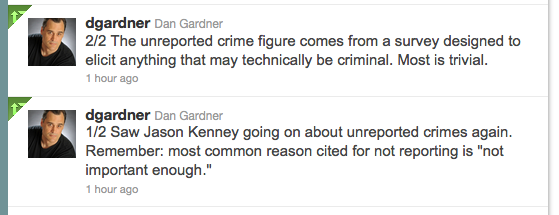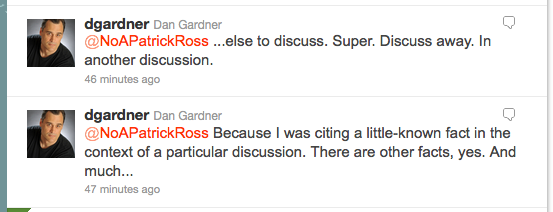Tuesday, November 08, 2011
Dan Gardner, the Media Party, and the Disintegration of Modern Journalism
Some Nexus readers may recall a Byline segment from early October wherein Brian Lilley commented on a segment of Canadian journalism he refers to as "the media party".
In the segment, Lilley actually names a few journalists he considers to be members of the media party. Chief among them is "author, journalist and lecturer" Dan Gardner.
Last night, Gardner witnessed Minister of Citizenship, Immigration and Multiculturalism Jason Kenney refer to unreported crime in explaining and defending the Conservative government's omnibus crime bill. Garner couldn't hold back his objection -- nor, necessarily, should he -- and took to Twitter to voice his objection.
Gardner, who Tweets under @DGardner decided to respond to Kenney's comments by first selectively citing data from the study, then by dismissing unreported crime as "trivial":
Your not-so-humble scribe couldn't resist the opportunity to ask Gardner a few questions about the assumptions he was making. Gardner's ultimate response was that he ultimately would not consider any other data points:
In other words, Gardner refused to talk about any weaknesses in the assumptions he was offering, or even any other information. If it was going to be discussed, it would have to be discussed with other people, because he won't.
There's good reason for this. The survey as a whole says far more than Gardner says it does, and the data points he himself is offering don't necessarily support his claims about it.
There are obvious problems with a response that begins and ends with "not important enough", and it has to do with the respondent's perception of the meaning of that phrase. The question of who the incident in question is perceived to be "not important enough to" is a very real question.
To blithely assume that this means that the victim of the crime in general didn't consider it important enough to report is to also assume that all respondents perceived the meaning of that phrase in a uniform manner. This would be a mistake.
When a response begins and ends with "not important enough", it's every bit as likely that the respondent could conclude that the crime in question was not important enough to the police as not important enough to them personally. In lieu of a better-defined response, either conclusion is equally likely, and it's much more reasonable -- and responsible -- to allow for the probability that those who submitted that response had either of these in mind. Some likely concluded the former, and some likely concluded the latter.
Yet to ask Dan Gardner if the conclusion he reached -- that this response indicates that most of Canada's unreported crime is trivial -- is reasonable considering the ambiguous nature of this data is apparently to precipitate a meltdown on his behalf. If last night's events are any indication, he simply can't cope with that idea.
To ask him about the second-ranked response -- "police could not do anything about it" -- is apparently to make it worse. Gardner's response was that this was a worthy point to be discussed, but that he personally wouldn't. (That the second-ranked response trailed the first-ranked response by less than ten percentage points apparently did nothing to boost the worthiness of this data point in Gardner's eyes.)
It becomes difficult to avoid reaching the conclusion that, in the canon of the far-left media, these are forbidden questions. "Does the data actually indicate what you're saying it does?" That question is forbidden. "Isn't the second-ranked response also worthy of consideration?" That question is also forbidden.
What seems to emerge, in Dan Gardner's case, is that of a man who has not embraced journalism as a means with which to provide people with information or even ideas. Rather, he's embraced the journalistic enterprise purely as a means of political advocacy. Nothing else.
It's hard to escape the conclusion that Gardner is simply a card-carrying member of the media party. The media party has an agenda, and in this case it's in preserving the soft-on-crime, hug-a-thug policies that they claim have reduced crime in Canada, but in reality have not. The Stats Can study itself states that in no uncertain terms -- victimization in Canada has remained stable.
In support of that agenda, Gardner sets out to turn public attention away from specific data points that do not support that agenda, and toward data points that seem to support it only if they go unexamined.
It's one thing to insist that Canadians aren't reporting specific crimes because they're "not important enough", whatever that might mean to the individuals who offered that response.
To insist that the unreported crimes are trivial is remarkably obtuse when one considers what those unreported crimes are:
Of the crimes unreported in Canada, the number one is break and enter. That is not a trivial crime. The second is motor vehicle or parts theft. That is not a trivial crime. The third is robbery. That is not a trivial crime. The fifth is physical assault. That is not a trivial crime.
The fourth was vandalism. That could be a trivial crime, but not necessarily. The sixth and seventh were theft, or personal property and household property respectively. That, too, could be a trivial crime, but not necessarily.
It's not up to Dan Gardner to decide if the unreported victimization of Canadians is trivial. It's up to each individual victim to decide that for themselves and admittedly, many of them might reach that conclusion. Many might not.
But this is how the media party operates: they assume that they speak for Canadians as a whole, then they pretend to.
In the end, Dan Gardner's impotent response to the questions he was asked was to label your not-so-humble scribe a "troll". Basically it amounts to an accusation that the questions over whether or not Gardner has given ample consideration to the meaning of the data points he offers is "inflammatory, extraneous, or off-topic", as Wikipedia would have it.
The questions over whether or not Gardner is accurately interpreting the data offered by this survey are very clearly on-topic. It's simply a question that he considers forbidden: it's entirely reasonable to ask in the face of ambiguous data with a wide berth of potential meanings, but it seems to be Gardner's belief that no one is allowed to ask that question.
To this end, Dan Gardner is wrong. People have the right to ask these questions, and if Gardner, demanding merit in the public eye, refuses to discuss them, then it's he who has abandoned the lofty aspirations of journalism.
It's not what one would expect from a journalist. But it's precisely what one would expect from a member of the media party.
Labels:
Brian Lilley,
Conservative party,
Crime,
Dan Gardner,
Jason Kenney,
Twitter
2 comments:
Post your comments, and join the discussion!
Be aware that spam posts and purile nonsense will not be tolerated, although purility within constructive commentary is encouraged.
All comments made by Kevron are deleted without being read. Also, if you begin your comment by saying "I know you'll just delete this", it will be deleted. Guaranteed. So don't be a dumbass.
Subscribe to:
Post Comments (Atom)






God, this is weak. Stay in school boy.
ReplyDeleteI'd invite you to elaborate, but somehow I know you won't.
ReplyDelete